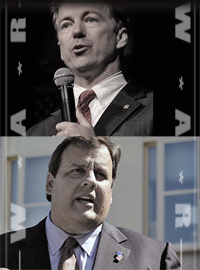| A War Worth Fighting: Rand Paul and Chris Christie |
 |
|
By Troy Senik
Thursday, August 08 2013 |
Don’t look now, but the 2016 presidential campaign just got kicked off a few years early. The occasion: a characteristically blunt jab dealt from New Jersey Governor Chris Christie to Kentucky Senator Rand Paul. Christie, responding to questions during a recent event at the Aspen Institute in Colorado, referred to the GOP’s newly ascendant libertarian impulse on national security as “a dangerous thought,” claimed that its advocates were prone to “esoteric debates,” and specifically named Paul as one of the offending parties. He even suggested that anyone holding such views should have to explain themselves to the widows and orphans of 9/11 victims. The more Christie went on, the further afield he got from the core issue (the 9/11 reference, for instance, was a clear attempt to play an emotional trump card). In later responses to Christie’s comments, Paul also let the skirmish wander, eventually making it into a debate over whether Christie was excessively covetous of federal money for New Jersey. The whole affair ended with Paul offering to discuss their differences over a beer – and Christie rejecting it. It was a pretty unimpressive exchange, which is unfortunate because having figures like Christie and Paul at the forefront of the national stage ought to be a source of pride for Republicans. Christie is one of the most effective reformist governors in the country, and he’s doing it as a Republican in a blue state. Paul is a first-term senator who’s doing more to reshape the ideological contours of his party than most people do in the course of a career. Neither of those are small accomplishments. Keep in mind that during the last round of GOP presidential jousting, we were hearing from the former head of a pizza company and a member of Congress who claimed to have found a link between vaccines and mental retardation. This is progress. Still, the fact that the debate so quickly devolved into schoolyard taunts was a shame. Christie and Paul represent a very real tension within the GOP, and one that has potentially profound implications for the country as a whole. Christie stands for the view that concerns about civil liberties, particularly as they grow more abstract, can actively undermine efforts to protect American lives and deter or defeat terrorism. Paul contends that the demands of national security can’t be a blank check for the growth and intrusiveness of government without fundamentally undermining the American project. Here’s why a real debate over this topic would be so compelling: Both men are probably, in some measure, correct. Any conservative worth his salt should instantly cotton to Paul’s underlying principle: Our level of distrust in government should be proportionate to the amount of power it wields. Particularly in cases where the government’s actions are kept secret and meaningful oversight is hard to come by, it’s folly to blindly trust fallible human beings to perform at a level of angelic perfection. You cannot simultaneously fear the mandarins of the IRS and blithely dismiss the capacity for mischief from people who have access to your phone calls and e-mails. Christie, however, is doubtlessly right that there are diminishing returns to the protection of privacy. Surely there is a point at which safeguards meant to prevent government abuse do more to imperil national security than to protect individual liberty, at which point the entire endeavor becomes somewhat self-defeating. No one is pining, after all, for the freedom to be killed by terrorists. As it stands now, both men are attacking an extreme version of the other’s logic. Those kind of fights can quickly devolve into caricature, especially because they usually fail to take into account the shades of gray that are more prevalent in the contingent world foreign policy and national security decisions than they are in ordinary domestic policy. The real action occurs in the space in the middle – the area where we face the closest calls between national security on the one hand and civil liberties on the other. Those decisions are agonizingly tough – and require thoughtful deliberation. They are, in short, precisely the kind of dilemmas an aspiring President of the United States should have to wrestle with before ever taking his oath of office. Let’s hope Christie and Paul both enter into the 2016 fray, if only to pressure each other into facing up to precisely those kinds of challenges with more candor and depth than this latest exchange produced. |
Related Articles : |
























